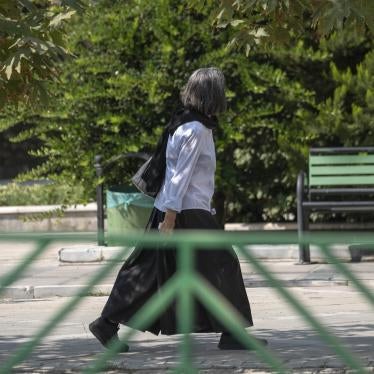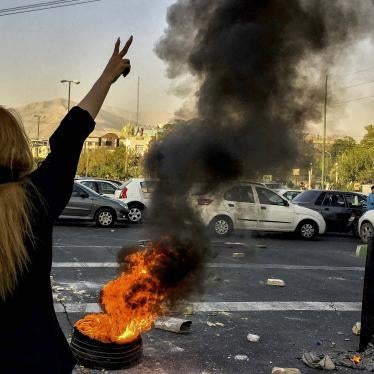(Beirut) – Iranian authorities have brought vague “propaganda” and “national security” charges against three journalists, Human Rights Watch said today. The authorities should drop the charges, which stem from the journalists’ reporting and writing on social media, and end the ongoing harassment, prosecution, and punishment of those exercising their rights to free speech.
The trial of the journalists – Saeideh Shafiei, Mehrnoush Zarei Henzaki, and Nasim Sultan Beigi – is scheduled for July 3, 2023, before Branch 26 of the Revolutionary Court. Under articles 500 and 610 of the Islamic Penal Code of Iran, each of these charges carries a sentence of up to five years in prison.
“Iran’s judiciary has once again begun summoning and harassing journalists and human rights defenders, punishing anyone who refuses to remain silent,” said Tara Sepehri Far, senior Iran researcher at Human Rights Watch. “The authorities have been relentless in prosecuting and punishing anyone reporting on the social issues and grievances that were central to the protests over the last months.”
The charges against Shafiei relate to several articles she wrote on topics such as rising poverty and the government's management of energy subsidies and public resources. The charges against Henzaki relate to her articles on reproductive laws and the state of Iran’s national parks.
Sultan Bigi’s charges are based on her collaboration with numerous domestic and foreign media outlets. The prosecutor has apparently sought the most severe penalty for Sultan Bigi due to her lack of cooperation during her interrogation and her promotion of the removal of the hijab.
Articles 500 and 610 criminalize “propaganda against the state” and “assembly and collusion to commit acts against national security.” Iran has a long history of using vaguely defined national security charges against protesters, dissidents, and journalists in trials that fall grossly short of international standards.
Revolutionary Guard agents arrested Shafiei, an economic journalist who had worked with several Iranian newspapers, at her home in Tehran on February 22, the Human Rights Activists News Agency (HRANA) reported. Authorities transferred her to Ward 2A in Evin prison in Tehran. She was released on March 8, upon posting bail of 500 million tomans (approximately US$12,150).
Revolutionary Guard agents arrested Henzaki at her mother’s home in Tehran on January 22. She was also transferred to Ward 2A in Evin prison and released on bail on February 15. Henzaki reports on health care and social issues for various Iranian outlets.
On the evening of January 11, Revolutionary Guard agents detained Sultan Beigi at Imam Khomeini International Airport as she attempted to leave Iran. They also transferred her to Ward 2A in Evin prison, then released her on a 1 billion Tomans (approximately $24,350) bail on February 6. Sultan Beigi previously worked as a journalist with several Iranian publications, such as Shargh Newspaper, Arman, Iscanews, and Shahrvand.
The authorities had previously arrested Sultan Beigi when she was a student activist in 2006, when she was detained for almost two months, and again in 2007. She was detained again from 2012 to 2013, serving a prison sentence she had received for her activism.
In September 2022, Iranians took to the streets to protest the death of Mahsa (Jina) Amini, a 22-year-old Kurdish Iranian woman, in the custody of the abusive “morality police,” as well as the autocratic government’s long track record of repression and impunity.
Iranian authorities cracked down against the nationwide protests with excessive and lethal force, killing hundreds of protestors. They also imprisoned tens of thousands of protesters, as well as hundreds of activists, journalists, and human rights defenders on dubious charges and issued death sentences in grossly unfair trials.
In February, Iranian authorities announced a broad amnesty, which included the release of many of those detained as well as pardons, or reduced sentences for those arrested, charged, or detained during the protest. But the Iranian authorities are now summoning several of activists and protesters just recently released, especially journalists, media have reported. It is unclear whether they are facing old or new charges.
Zahra and Hoda Tohidi, journalist and activist sisters, were arrested in September 2022, HRANA reported, and released on bail on December 17. On May 31, they were rearrested and transferred to Evin prison to serve a one-year prison sentence. On July 21, Alireza Khoshbakht, Zahra Tohidi’s husband, tweeted that authorities had brought a new charge – “propaganda against the state” – against her based on her Instagram account activity before she was detained.
Committee Follow Up Iran reported that in May, Branch 28 of Tehran's Revolutionary Court sentenced Ruhollah Nakhai, a journalist who was released in January, to two years and seven months in prison. Saeid Khalili, Nakhai’s lawyer, tweeted that Nakhai was sentenced even though he satisfied the conditions of the amnesty. Niloofar Hamedi and Elaheh Mohammadi, journalists from the Shargh and Ham-Mihan Iranian newspapers who were among the first to report on Amini’s death in custody and her funeral, have remained in Evin prison for nine months. They are charged with “collaborating with the hostile United States government,” “propaganda against the state,” and “assembly and collusion to act against national security.” They denied the charges and insisted that they were doing their jobs as journalists.
“The international community should keep cases of journalists and human rights defenders at the center of its engagement with Iran,” Sepehri Far said. “States should be demanding that Iran drop these and other ridiculous charges that authorities have brought against journalists.”









